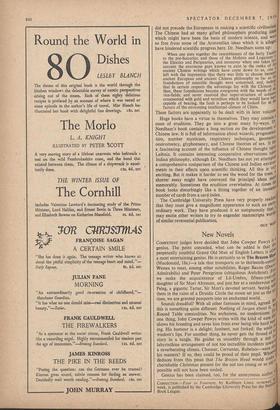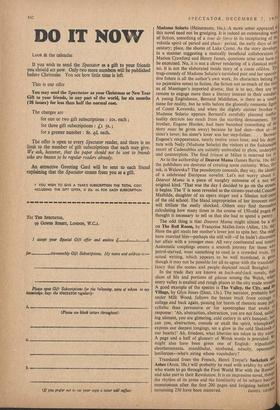New Novels
COMPETENT judges have decided that John Cowper Powys Is i! genius. The point conceded, what can be added is that th; perpetually youthful Grand Old Man of English Letters is Ofted a most entertaining genius. He is certainly so in The Brazen fleij, (Macdonald, 18s.)—a tale that transports us to thirteenth-cents Wessex to meet, among other notabilities, Roger Bacon (I3100?:si Admirabilis) and Peter Peregrinus (ubiquitous Antichrist). firid we make the acquaintance of Lil-Umbra, fifteen-year..0.: daughter of Sir Mort Abyssum, and join her at a rendezvous 0°,110 Peleg, a gigantic Tartar, Sir Mort's devoted servant. Seeing vi„0 them in the ruins of a Druidic Circle the moon set just as the S' rises, we are granted passports into an enchanted world. 10 Sounds dreadful.? With all other fantasies in mind, agreed. this is something quite different. Nothing of Jurgen about Round Table comicalities. No archaisms, no modernisms• one thing, John Cowper Powys writes with the kind of ease ti14, shows his breeding and saves him from ever being vile hard rea:1 ing. His humour is a delight; lambent, not forked; the smile wisdom's lips. For another thing, he never gets the thread of t; story in a tangle. He guides us smoothly through a not ts:i, labyrinthine arrangement of not too incredible incidents tovi°,r, a reverberating climax. Chaucer, Cervantes, Rabelais—were e his masters? If so, they could be proud of their pupil. WI:9,cl' deduces from this paean that The Brazen Head would 111",cot cherishable Christmas present for the not too young or as old possible will not have been misled. Genius has been claimed, too, for the anonymous authra'_J CORRECTION.—Four to Fourteen, by Kathleen Lines, reviewo.,1 week, is published by the Cambridge .University Press for the Nat' Book League. Madame Solario (Heinemann, 16s.).,A more sober appraisal Of this novel need not be grudging. It is indeed an outstanding work of fiction, something of a tour de force in its recapturing of the volatile spirit of period and place: period, the early days of this cebtury; place, the shores of Lake Como. As the story develoPs, in a manner suggesting a mutually beneficial collaboration of Marion Crawford and Henry James, questions arise and have to be exorcised. No, it is not a clever rendering of a classical myth: no, it is not the elaborated inside story of a cause celebre. 1111 tragi-comedy of Madame Solario's tarnished past and her specula' tive future is all the author's own work. Its characters belong (i° no pejorative sense) to fiction, the fiction not so much of the time as of Massinger's imported drama; that is to say, they are to° remote to engage more than a literary interest in their conduct' A young Englishman, Bernard Middleton, is there as a touch' stone for reality, but he wilts before the gloomily romantic figure of Count Kovanski, and when the slightly sinister brother of Madame Solario appears Bernard's carefully planned ineffee' tuality detracts too much from the startling denouement. Ibis brother, Eugene Harden, had been banished (something of the story must be given away) because he had shot—shot at—hl' sister's lover; his sister's lover was her step-father. . . . Betweel/ Eugene's reappearance, nearly twelve years later, and his dcPar. ture with Nelly (Madame Solario) the visitors at the fashionable resort of Cadenabbia are suitably embroiled in plots, underplots and counterplots. The final frisson at Milan is reserved for
As to the authorship of Dearest Mania (James Barrie, 10s. 60'
the publishers are desirous of creating some curiosity. Who, they ask, is Walewska? The pseudonym conceals, they say, the identiq of a celebrated European novelist. Let's not worry about it: Dearest Mama is a piece of naughty nonsense of a not vet): original kind. 'That was the day I decided to go on the streets, it begins. The 'I' is soon revealed as the sixteen-year-old Countess Mathilde, daughter of an opera singer and a Silesian nob:eMal/ of the old school. The bland improprieties of her innocent Mind will titillate the easily shocked—Others may find themselve5 calculating how many times in the course of 150-odd pages sbe thought it necessary to tell us that she had to spend a penny' The odd thing is that Dearest Mama might almost he a 411 on The Red Room, by Francoise Mallet-Joris (Allen, 13s. 6d'l Here the girl steals her mother's lover just to spite her. She might have married him—perhaps she still will—if he hadn't discovered her affair with a younger man. All very continental and intense" Automatic couplings ensure a smooth journey for those wit°' petrol-starved, want something to read in a crowded train. The actual writing, which appears to be well translated, is go°4: though it may not be possible for all to agree with the translator' fancy that the scenes and people depicted recall Breughel. In the trade they are known as bach-and-fach novels, these slices of life and portions of gateau among the Welsh, whetts . every valley is exalted and rough places in the city made smoOtP' A good example of the species is The Valley, the City, and the Village, by Glyn Jones (Dent, 15s.). The narrator, probably t °1110 under Milk Wood, follows the beaten track from cottage college and back again, pausing for bursts of rhetoric more poll' syllabic than persuasive or for apostrophes that evoke nil response: 'AIL abstraction, abstraction, you arc not food, satisfi. ing aliment, you are glittering, cold cutlery in art's banquet; 110 can you, abstraction, console or exalt the spirit, triumphan°1 express our deepest longings, set a glow in the cold Shekinah our hearts?' Ah, freedom, what liberties are taken in thy name' A page and a half of glossary of Welsh words is provided. We might also have been given one of English: tripudiati°,11' eleutheromania, mandibular, nimbated, edacity, opsomar) laniferous—who's airing whose vocabulary? Translated from the French, Henri Troyat's Sackcloth St° Ashes (Arco, 18s.) will probably be read with avidity by anY°tie tl who wants to go through the First World War with the Russ fil,5 and take part in their Revolution. It is an impressive novel, OOP the rhythm of its prose and the familiarity of its subject becoi6 monotonous after the first 200 pages and fatiguing before the nita remaining 250 have been mastered. DANIEL GE-



































 Previous page
Previous page